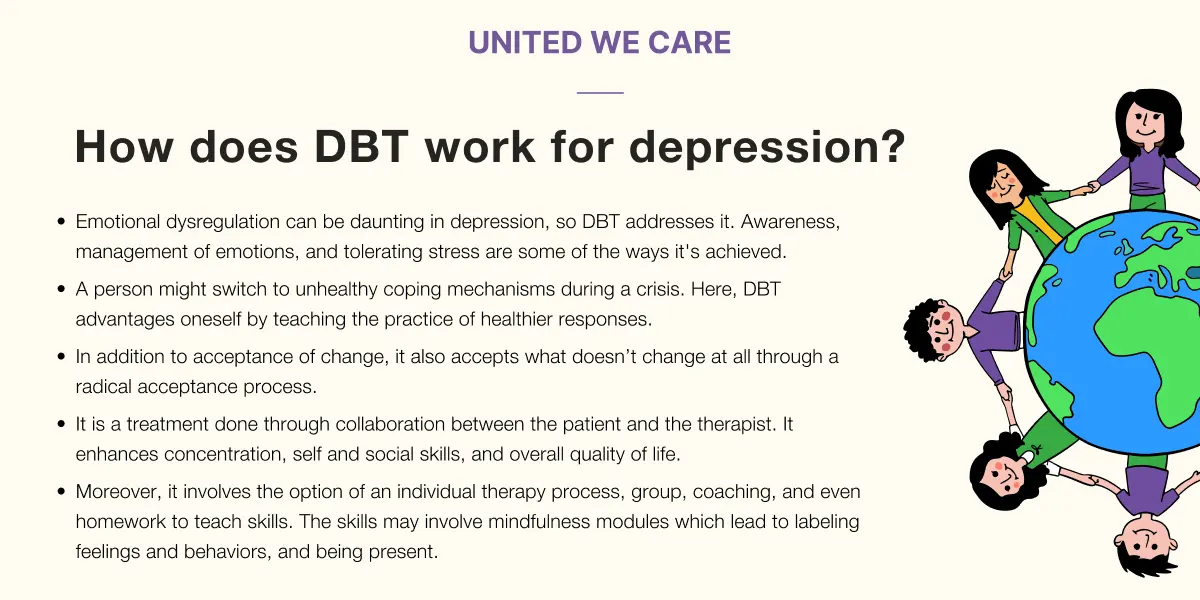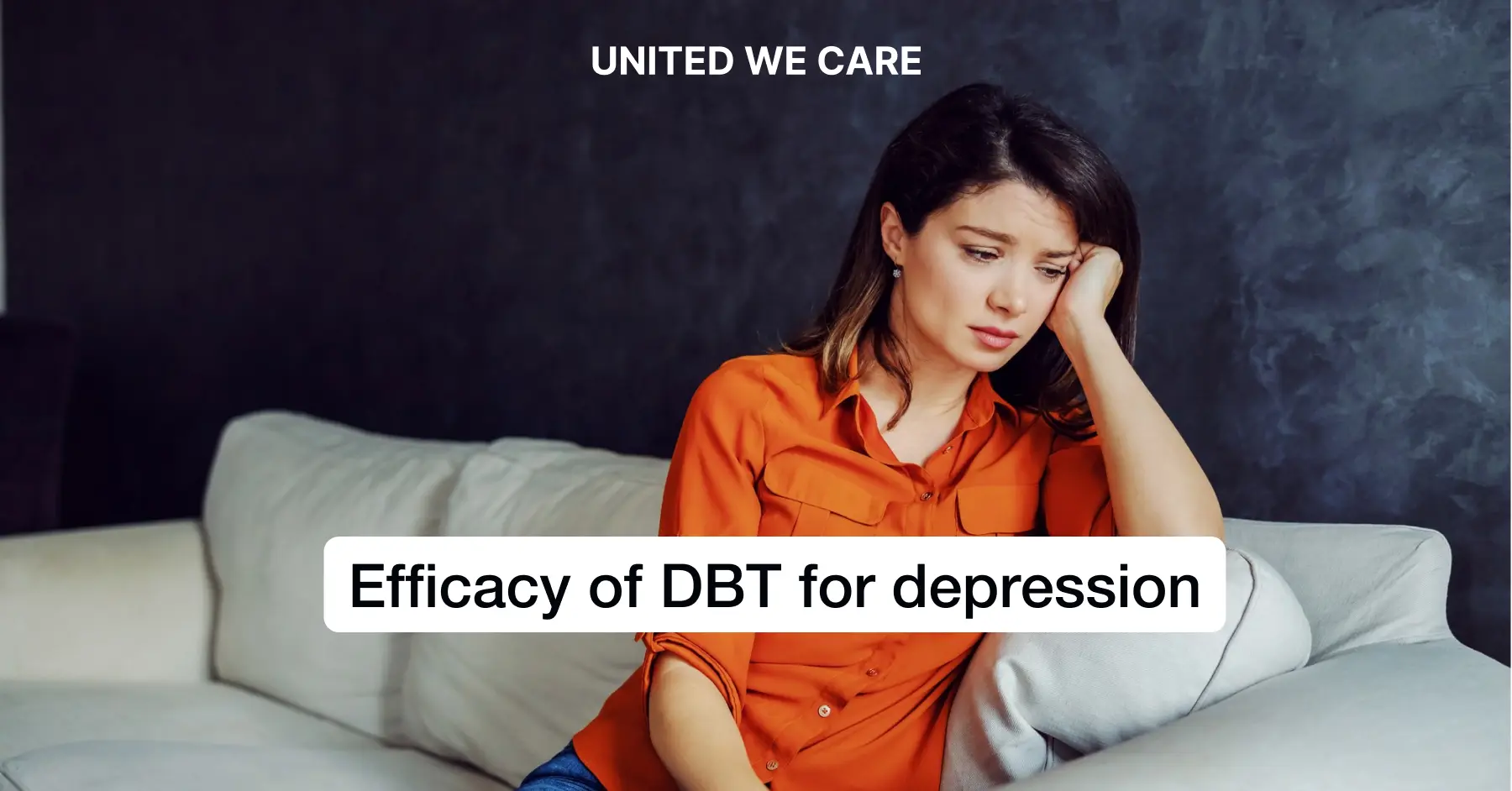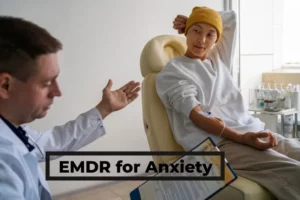Introduction
The kind of therapy that is tilted towards emotion regulation skills to manage mood is known as Dialectical Behaviour Therapy (DBT). It adopts some methods from CBT and implements mindfulness and behavior changes accordingly. Along with this, it aims to help patients with emotions, relationships, and living life to the fullest, even with depression.
How does DBT Work for Depression?
To help a patient with depression, DBT has many ways to deal with it. It works in the following manner during the treatment:

- Emotional dysregulation can be daunting in depression, so DBT addresses it. Awareness, management of emotions, and tolerating stress are some of the ways it’s achieved.
- A person might switch to unhealthy coping mechanisms during a crisis. Here, DBT advantages oneself by teaching the practice of healthier responses.
- In addition to acceptance of change, it also accepts what doesn’t change at all through a radical acceptance process.
- It is a treatment done through collaboration between the patient and the therapist. It enhances concentration, self and social skills, and overall quality of life.
- Moreover, it involves the option of an individual therapy process, group, coaching, and even homework to teach skills. The skills may involve mindfulness modules which lead to labeling feelings and behaviors and being present.
Why DBT is Better than CBT for Chronic Depression
Chronic depression should be dealt with with professional care. For this reason, medications or CBT might not be as effective, even according to the research. It is to be noted that 71% of adults have been able to reduce depression with DBT. Meanwhile, for only 47% of people, it worked with just medications. Unlike CBT, DBT for depression works due to the focus on enhancing treatment retention.
DBT has been proven to reduce your feelings of hopelessness in cases of depression because of the practice of radical acceptance. Furthermore, it definitely manages intense emotions better than CBT can. A switch from DBT skills mastery to CBT might help with a change in negative thought patterns that are the base of chronic depression. Hence, DBT fulfills a client’s needs when in depression, and it allows flexibility tailored to one’s issues as well. It acknowledges feelings, behaviors, and thoughts but deals with them better than CBT does.
Efficacy of DBT for Depression
DBT really has the ability to present desired outcomes in terms of depressive symptoms and suicidality.
- It has successfully managed to outperform control groups by combining skill training with medication.
- Additionally, it definitely works better than just medication. Also, it resolves emotional dysregulation in depression.
- According to the cases of DBT with depression, 16 weeks of skill group has offered a drastic reduction in depressive symptoms.
- Since it offers a variety of techniques like distress tolerance, emotional regulation, and more, it is suitable for other reasons as well.
- It is well-versed in treating substance abuse and even borderline personality disorder. It withstands the adversity of depression and has been proven to show a 75% remission rate with medication support.
- On the other hand, it uses modules like distress tolerance, interpersonal effectiveness, and emotion regulation.
- Thus, it suggests the identification of self-harm triggers, observation of emotions, and analysis of reciprocal relationships.
Conclusion
DBT is a helpful technique when it comes to depression because it improves the key problem of depression. That is the ability to manage your emotions better. Considering how 6.7% of US adults go through depression annually, it is important to treat it. It also leads to thoughts of either suicidality or unhealthy responses like substance abuse to escape complex feelings.
DBT is a great way to handle overwhelming feelings, and furthermore, CBT can’t deal with such chronic cases. It has a toolbox that offers skills for instant management of distress caused by depression. Not just this but also acceptance of unavoidable pain and controllable changes. Hence, Dialectical Behaviour Therapy induces the management of feelings in a better manner when in depression. Additionally, it deals with a wide variety of relevant issues as well that might affect one’s tolerance of stress with mindfulness.
To understand mental health better and find kindness with care, talk to us at United We Care.
References
- R. Harley et al., “Adaptation of dialectical behavior therapy skills training group for treatment-resistant depression,” *The Journal of Nervous and Mental Disease*, vol. 196, no. 2, pp. 136-143, 2008.
- J. Pistorello et al., “Dialectical behavior therapy (DBT) applied to college students: a randomized clinical trial,” *Journal of Consulting and Clinical Psychology*, vol. 80, no. 6, p. 982, 2012.
- E. Saito, A. A. Tebbett-Mock, and M. McGee, “Dialectical behavior therapy decreases depressive symptoms among adolescents in an acute-care inpatient unit,” *Journal of Child and Adolescent Psychopharmacology*, vol. 30, no. 4, pp. 244-249, 2020.
- M. M. Linehan and C. R. Wilks, “The course and evolution of dialectical behavior therapy,” *American Journal of Psychotherapy*, vol. 69, no. 2, pp. 97-110, 2015.
- R. C. Kessler et al., “Twelve‐month and lifetime prevalence and lifetime morbid risk of anxiety and mood disorders in the United States,” *International Journal of Methods in Psychiatric Research*, vol. 21, no. 3, pp. 169-184, 2012.
- A. T. Beck, R. A. Steer, and G. K. Brown, *Beck Depression Inventory*. New York: Harcourt Brace Jovanovich, 1987.
- T. R. Lynch et al., “Dialectical behavior therapy for depressed older adults: A randomized pilot study,” *The American Journal of Geriatric Psychiatry*, vol. 11, no. 1, pp. 33-45, 2003.
- N. E. Cook and M. Gorraiz, “Dialectical behavior therapy for nonsuicidal self‐injury and depression among adolescents: Preliminary meta‐analytic evidence,” *Child and Adolescent Mental Health*, vol. 21, no. 2, pp. 81-89, 2016.
- T. R. Lynch and J. S. Cheavens, “Dialectical behavior therapy for depression with comorbid personality disorder,” in *Dialectical Behavior Therapy in Clinical Practice: Applications Across Disorders and Settings*, L. A. Dimeff & K. Koerner, Eds. New York: The Guilford Press, 2007.










